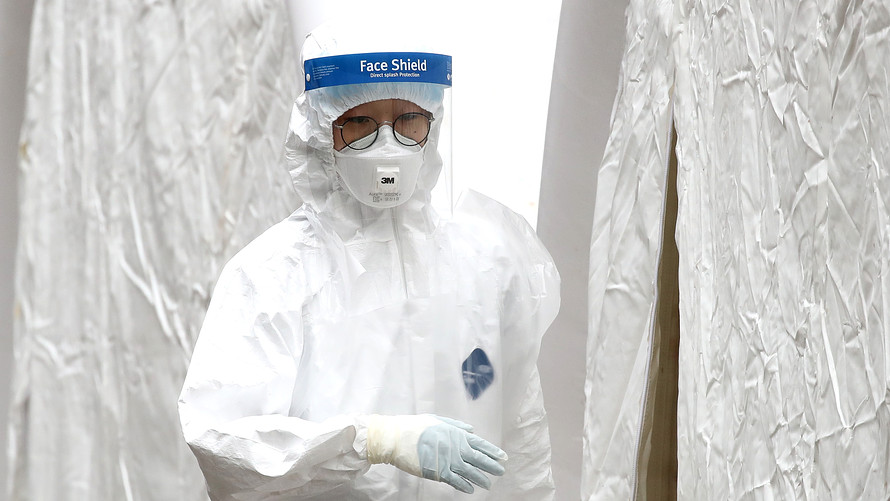MIAMI — Shares of cruise line operators fell on Friday after the U.S. Department of State said Thursday that U.S. citizens should “reconsider” traveling on cruise ships to or within Asia over concerns about COVID-19, the novel coronavirus has sickened more than 76,000 people worldwide.
Carnival Corp. CCL, -1.91% was down 1.5%, Norwegian Cruise Line Holdings Ltd. NCLH, -3.17% down 2.5%, and Royal Caribbean Cruises Ltd. RCL, -3.36% down 3.5% in trading on Friday afternoon.
The State Department reiterated that sentiment on a call with reporters on Friday.
“This is a dynamic situation and U.S. citizens traveling by ship may be impacted by travel restrictions affecting their itineraries or ability to disembark, or may be subject to quarantine procedures implemented by the local authorities,” the department said in a statement.
The Diamond Princess, a ship operated by Carnival that is now docked at a port in Yokohama, Japan, has reported 634 cases and two deaths as a result of the virus. Separately, Carnival’s Westerdam cruise ship, which eventually docked at Sihanoukville, Cambodia, had been turned away from other ports over concerns of sick passengers. All three cruise line operators have canceled voyages in Asia.
The travel industries have been particularly hard by the outbreak as dozens of countries have put into place travel restrictions. A new estimate from the International Air Transport Association predicts that COVID-19 may lead to $29.3 billion in lost revenue for airlines based on a scenario in which this outbreak has a similar impact on air travel demand to severe acute respiratory syndrome (SARS), also a type of coronavirus.
Air France-KLM AF, -2.43% said Thursday it expects to lose €150 million ($163 million) to €200 million as a result of the outbreak. “We have totally stopped operations to China for both the main and secondary cities,” CFO Frédéric Gagey told investors on an earnings call. Separately, the Empire State Realty Trust Inc. ESRT, -1.74%, which owns the Empire State Building in New York City, told investors that there are currently only six weekly flights between cities in China and New York City. Chinese tourists accounted for 3% of the company’s revenue in the first quarter of 2019.
The Los Angeles Tourism & Convention Board has said it expects to lose $921 million in direct spending from Chinese tourists in 2020.
Norwegian, which anticipates losing 75 cents from earnings per share in 2020 after canceling 40 cruises in Asia, told investors on Thursday that customers began canceling cruises outside of Asia after the Diamond Princess was quarantined in Japan. Americans are now choosing to book cruises in Alaska and the Caribbean. “You don’t have to get on an airplane to get to the Caribbean ports,” Norwegian CEO Frank Del Rio said on an earnings call. “Those seem to be doing better than some of the more exotic or far-flung destinations.”
COVID-19 was first detected in December in Wuhan, China. The outbreak has largely shut down Hubei Province, home to Wuhan, and slowed or halted factory production and consumer spending across parts of China.
The worldwide number of new cases of COVID-19 has continued to slow even as cases in South Korea doubled overnight and China’s Hubei Province updated its figures to include a tally of cases diagnosed among prisoners.
There are now 76,785 confirmed cases of and 2,249 deaths, according to the latest figures from the World Health Organization. That is about 1,000 new cases, compared with the 3,000 or so new cases that were being reported daily in early February. Hubei reportedly added 271 infections among prisoners to its tally, a move that prompted questions about whether there are other unreported virus cases in the country, according to The Wall Street Journal.
Outside of China, a cluster of infections in South Korea led to the diagnoses of 100 new cases overnight, bringing the total number of cases to 204 there. South Korea has reported one death.
In the U.S., there are 34 confirmed cases. That includes 21 people who were repatriated from Asia, including 18 from the Diamond Princess, and another 13 cases, including a new one confirmed Thursday by the Humboldt County health department in California.
Here’s what companies are saying about the impact of COVID-19 on their businesses:
• Lululemon Athletica Inc. LULU, -2.95% said Friday that the majority of its 38 stores in China have been closed since Feb. 3. The yoga gear seller said it continues to “monitor the situation” and will provide an update on the expected financial and operational impact during its fourth-quarter post-earnings conference call in late March.
• The Coca-Cola Company KO, +0.69% said Friday it is still expecting to reach its full-year guidance though COVID-19 will likely weigh on first-quarter results. Coca-Cola said it currently estimates an approximate 2- to 3-point impact to unit case volume, 1- to 2-point impact to organic revenue, and 1- to 2-penny impact to earnings per share for the first quarter. The Chinese market makes up 10% of Coca-Cola’s global volume, the company said in January.
• ITT Inc. ITT, +3.37% on Friday updated its 2020 guidance, providing a downbeat outlook that included an estimated impact from the outbreak. For 2020, the manufacturer currently expects adjusted EPS of $3.87, and offered a wider range of $3.72 to $4.02, compared with the FactSet consensus of $3.99.
• Hormel Foods Corp. HRL, -1.67% expects its international business to have a “very difficult” second quarter as a result of COVID-19. The company said Thursday there has been a slowdown in sales in China, with many restaurants closed, but sales of pantry items like Skippy peanut butter and canned pork Spam have increased. “Similar to other companies in China, all aspects of our in-country supply chain are operating more slowly and at higher cost than normal,” CEO James Snee told investors.
• Domino’s Pizza Inc. DPZ, -0.32% said Thursday that fewer than 20 of its stores are closed in China and the outbreak is slowing down the openings of new stores in that market. Last year, Domino’s opened 80 net new stores in China.
Additional reporting by Steve Goldstein and Tomi Kilgore
To read more:
https://www.theguardian.com/world/2018/jun/15/chinese-defend-einsteins-diaries-filthy-obtuse



